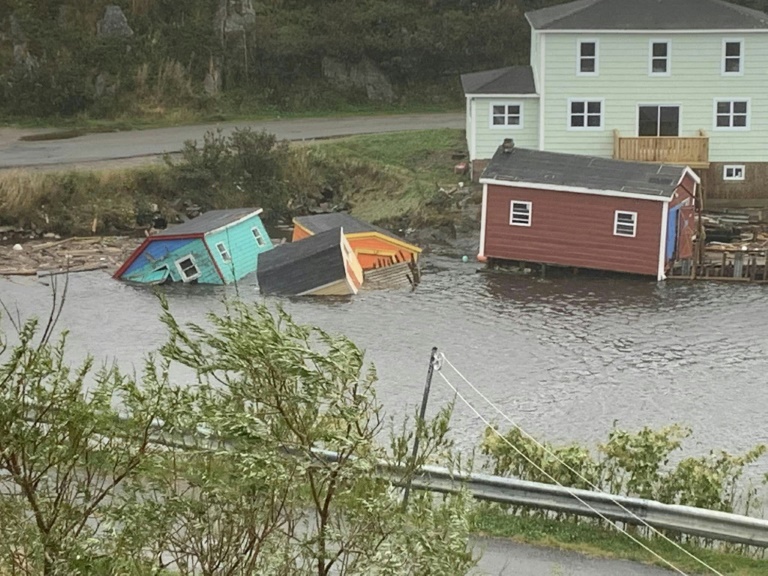This handout image provided by Pauline Billard on September 25, 2022 shows damage caused by Hurricane Fiona in Rose Blanche-Harbour le Cou, Canada
Parts of eastern Canada suffered “immense” devastation, officials said Sunday after powerful storm Fiona swept houses into the sea and caused major power outages, as the Caribbean and Florida braced for intensifying Tropical Storm Ian.
Canadian authorities have now confirmed two deaths caused when Fiona, then a post-tropical cyclone, tore into Nova Scotia and Newfoundland early Saturday.
Fiona had earlier claimed seven lives as it roared through the Caribbean at the start of a week of havoc.
Officials on Prince Edward Island on Sunday confirmed the death of one person there, though there were few details.
And officials have found the body of a 73-year-old woman believed to have been swept from her home in Newfoundland. She apparently was sheltering in her basement when waves broke through.
The storm packed intense winds of 80 miles (130 kilometers) per hour when it arrived with force rarely seen in eastern Canada, bringing torrential rain and waves of up to 40 feet (12 meters).
“The devastation is immense,” Nova Scotia Premier Tim Houston told reporters. “The magnitude of the storm is incredible.”
Storm surges swept at least 20 homes into the sea in the town of Channel-Port aux Basques, on the southwestern tip of Newfoundland.
Mayor Brian Button described “a total war zone” in the coastal community.
Some 200 residents had been evacuated before the storm hit.
On Sunday, residents were reckoning with the damage.
“Some people have lost everything, and I mean everything,” Button told CBC News.
“The sea was taking back the land and we were getting separated. A lot of our homes are built along the coastline along the Atlantic Ocean. Down there, Fiona just wiped out parts of that,” he said.
Tempers were fraying Sunday as residents tried to return to their homes — or what was left of them.
“I know people are showing up at the barricades angry this morning and wanting to move in and go check up on their properties,” said Button in a live video on Facebook.
“You’ve got to give us a little bit of time… Unfortunately, this is going to take days, could take weeks, could take months in some cases,” he said.
– ‘Incredible storm’ –
More than 300,000 people were still without electricity across five provinces Sunday after the storm felled trees, ripped roofs from buildings and damaged power lines, officials said. Hundreds of utility crews were working to restore power.
Nova Scotia premier Houston told CBC the Canadian military had been deployed to help clear trees and roads.
Emergency Preparedness Minister Bill Blair said the Canadian armed forces would also provide assistance to Newfoundland’s cleanup efforts. This is the third province to request federal military assistance, after Nova Scotia on Saturday and Prince Edward Island earlier Sunday.
Television images showed a long line of cars and people on foot queuing to get gas for generators in Cape Breton, an island off Nova Scotia, where dozens had spent the night in relief centers operated by the Canadian Red Cross.
On Prince Edward Island, Charlottetown Police Chief Brad MacConnell pleaded with residents to stay inside as recovery efforts continue.
“We ask people to stay home unless absolutely necessary,” he told CBC, adding that there’s “a lot of devastation” and hardly an area of the city that had not been significantly affected.
Prime Minister Justin Trudeau said on Twitter that he had met again with his Incident Response Group to ensure that “resources are available to help those affected by the storm.”
By Sunday, with a waning Fiona dissipating over the Labrador Sea, the country’s environmental agency said all warnings had been canceled.
– Ian to become major hurricane –
Further south, parts of the Caribbean as well as the US state of Florida were preparing for Tropical Storm Ian, which the US National Hurricane Center (NHC) said is forecast to become a hurricane on Monday and a major hurricane the following day.
Packing winds of near 60 miles per hour and getting stronger, the storm is expected to pass near the Cayman Islands, either near or over western Cuba, and then head toward Florida, the NHC said.
A hurricane warning is in effect for parts of Cuba — where the storm is forecast to “produce significant wind and storm surge” — as well as the British territory of Grand Cayman, according to the NHC.
Florida’s Governor Ron DeSantis said Saturday that he had declared a state-wide emergency in preparation for the storm, warning on Twitter that “Floridians should take precautions.”
Authorities in several Florida municipalities including Miami, Fort Lauderdale and Tampa began distributing free sandbags to residents to help them protect their homes from the risk of flooding.
“It’s never too early to prepare,” tweeted Jane Castor, the mayor of Tampa.
burs/st/bbk/wd/to









